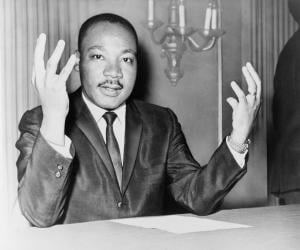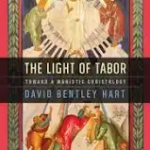Martin Luther King believed and said that “man’s law” is not the “higher law” and that the “higher law,” which he specifically identified as “the moral law” or “God’s law” justifies civil disobedience to man’s law. This was stated in his famous “Letter from Birmingham Jail.”
MLK was a Christian theologian and a prophet. He openly based many of his claims about justice on biblical prophets and on Jesus’s teachings. His Christianity was in the forefront of his ministry and activism even though he welcomed non-Christians to work with him.
When my daughter was in Middle School I examined one of her textbooks. It was about cultural geography of the world. The section on America downplayed the role religion has played in American history and culture while emphasizing the roles religions have played in other cultures. The contrast was obvious and undeniable.
The section on MLK never mentioned that he was a Christian or a minister. I protested these omissions to the school district but was dismissed as a fundamentalist textbook would-be censor. That is to say I never heard back.
People who want religion, especially Christianity, culturally marginalized and privatized have overlooked or ignored MLK’s religious beliefs and commitments.
A question for those who admire MLK, as I do, should answer about his appeal to a “higher law” than “man’s laws.” What is that? For him, obviously (to anyone who has studied his life and ministry), it was God’s law even though he also mentioned “the moral law.” He did not really separate them.
MLK also talked about a “separation” principle which was, for him, humans’ separation from God that leads man’s law astray from God’s law or the moral law.
I do not believe that MLK wanted America to be a Christian theocracy. He believed in separation of church and state. But he also assumed that many, if not most of his readers and hearers would be impressed by an appeal to God’s law. After all, America’s currency says “In God We Trust.”
This is what I mean by “soft Christendom”—a cultural condition in which God-talk is not dismissed as irrelevant to anything important. A cultural condition in which even public schools can talk about God without worrying that they will be sued. Where love, as understood by Christians, can be upheld as a good moral value even in public schools and the public square generally.
It is not a cultural condition in which the government(s) censor non-Christian voices. But it is a cultural condition in which Christian values such as love (including love for enemies) can be taught as something good and right by teachers, legislators, journalistic commentators. And where hate can be condemned without fear of censorship by an employer.
This is what theologian Paul Tillich meant by “theonomous culture.” Not “Christian reconstructionism” but a culture in which religious-spiritual values can be expressed publicly without fear of ridicule or censorship, even by the secular media.
When I lived in Minnesota, there was a well-known and highly regarded female television station manager who was an evangelical Christian and frequently spoke in churches and to Christian gatherings. Her son was my student. I knew what happened to her more through him than through newspaper reports. She was fired by the company that owned the station solely on the grounds of her openness about her religious faith.
What I am calling “soft Christendom” already exists to some extent in some locations in America (and elsewhere). But there are also places where it is harshly criticized and excluded, with all religious belief being forced to be private.
The problem is that people who do that to religious people, especially Christians, often, usually, admire MLK while overlooking or ignoring his Christian beliefs, values and commitments.
Another illustration. In Minnesota, specifically St. Paul, my daughter was awarded for her excellence in Middle School. At the award ceremony an African-American teacher who was also a Christian minister was asked to give a brief “inspiration talk” to open the ceremony. He recited, with gusto, the poem “Invictus.” Invictus is, of course, a very secular “inspirational poem.” It is not neutral. It expresses Henley’s worldview. Many Christians would consider it deeply contrary to Christian values, to the values Jesus’s taught. And yet, no one protested that as the “inspirational talk” which took the place of what would have been a Christian (or at least friendly to Christian) inspirational talk in a public school a hundred years ago or in a different location today.
What I wondered as I listened to that teacher preach Invictus was what would happen if he or someone else quoted a Christian poem such as “The Grandeur of God” by Hopkins? I suspect he or she would have been interrupted or later chastised. But why? If “all voices” have “equality” in the “public square?”
On the other hand, in soft Christendom, some voices would be rejected. If a neo-Nazi, for example, promoted hatred toward Jews or Black people, everyone else, in a soft Christendom context, would protest and rightly so.
*Note: If you choose to comment, make sure your comment is relatively brief (no more than 100 words), on topic, addressed to me, civil and respectful (not hostile or argumentative), and devoid of pictures or links. Know that not all comments offered are posted here. Consider this like an Opinion Page of a newspaper or magazine. As the “editor” I select some comments and omit others. It is my right to do so.*













